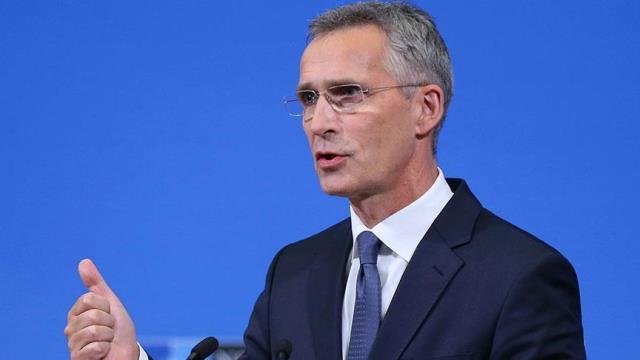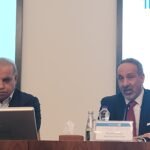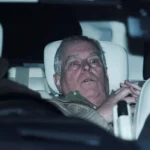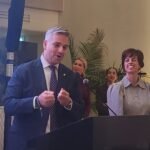Brussels 08 June 2018
Jens Stolenberg, Secretary General NATO met media after Defense Ministers of NATO countries finished their meeting today on Friday in Brussels, Belgium.
We just finished a productive meeting on NATO-EU cooperation. We were joined by High Representative Federica Mogherini and by our colleagues from Finland and Sweden.
Over the past two years, NATO and the European Union have achieved an unprecedented level of cooperation. This is natural. We have many shared members. We have shared interests and challenges and more than 90% of EU citizens live in a NATO country. So we have been working together on 74 concrete areas of cooperation. Including hybrid and cyber, maritime operations, fighting terrorism, exercises and military mobility and women, peace and security. The progress has been substantial. For example, our organisations now exchange real-time warnings about cyber-attacks and malware. We have stepped up our cooperation to enhance training, exercises and strategic communications to counter hybrid threats. And NATO and the EU are cooperating on maritime operations.
In the central Mediterranean, our Operation Sea Guardian is supporting the EU’s Operation Sophia. And in the Aegean, NATO and the EU are cooperating to counter people smuggling. We discussed how NATO and the European Union could cooperate even more closely going forward. In July, I plan to sign a new joint declaration with President Tusk and President Juncker. To set out a shared vision for how we will continue to address our most pressing security challenges. Military mobility is one area that will become a flagship in our cooperation. Both NATO and the EU have an interest in making it happen and both of us can make tangible contributions. We need to deal with a wide range of issues – from legislation to infrastructure. So I have recently shared with my EU counterparts and all NATO Allies our infrastructure requirements for transportation, including for bridges, roads and runways. And ultimately it is for our nations to make the decisions that will enable us to move across Europe as quickly as we need to, in an unpredictable security environment.
We also discussed what more we can do to complement each other’s efforts in the south.
For example, both NATO and the EU are increasing our presence in Iraq. The EU is rightly focusing on the civilian security sector.
While NATO’s focus is on capability building of the Iraqi defence and security structures.
The professionalization of the military education system, and training the trainers for the military. Robust coordination and consultation between NATO and the EU will help ensure that complementarity continues. With our teams working closely together. Which will help us meet the needs of our Iraqi partners and support them to ensure that ISIS does not return.
We also heard from Vice President Mogherini about the EU’s broader efforts on defence. This will include more investment, better capabilities, and fairer burden-sharing. I welcome these steps. Taken forward in the right way, NATO-EU cooperation and EU defence efforts can enhance security for all of us.
And with that, I am ready to take your questions.
Oana Lungescu [NATO Spokesperson]: OK, we'll go to the front row.
Question: Thank you. Mr Secretary General, two questions: First, I have noticed that in your recent comments you mentioned several times the concept of forward presence. Zooming in, in the Eastern Flank, we… until now, we had enhanced forward presence in Poland and the Baltics and tailored forward presence in Romania and Bulgaria. Now it seems more coherent. In practical terms, what does this conceptual shift means about forward presence? And for NATO-EU cooperation and the joint declaration, did you agree on any specifics regarding military mobility? Thank you.
Jens Stoltenberg [NATO Secretary General]: I don’t know if I fully understood what you meant by the shift in the concepts.
Question: I meant that since the Warsaw Summit we had an enhanced presence for Poland and the Baltic States, and a tailored forward presence in the south-east part of the Alliance. Now you mentioned several times in your speeches, even yesterday, about the forward presence in the Alliance, in the entire Alliance, but I was asking specifically about the eastern part.
Jens Stoltenberg [NATO Secretary General]: OK. Now, what we have done is that we have adapted NATO and the NATO defence posture in many different ways and we have done it step by step. And this is partly about increasing the forward presence in the eastern part of the Alliance, in the Baltic countries and Poland, but we also have what we call a tailored forward presence in the Black Sea region. Then, the main focus now is… has been on our ability to reinforce. And that is partly linked to the tripling of the size of the NATO Response Force, but also related to what we agreed yesterday, to have what we call the four 30s, 30 battalions, 30 air squadrons, 30 battleships, ready within 30 days or less. They of course can move in any direction, depending on where there is a need, in the south or in the east or wherever. So, this is about NATO's ability to respond to threats and challenges coming from… or stemming from any direction. So, this is about NATO's deterrence and defence. We have increased our presence in the eastern part of the Alliance, but we have also increased our ability to move in all directions if needed.
Then on military mobility, which is actually linked to that. To be sure that we are able to reinforce, we have to be able to move forces, and therefore much of what we now do is linked to that by, for instance establishing the new Atlantic Command, the new Support Command in Europe, which will plan exercise for the movement of forces, for reinforcements, but also military mobility, which is very much linked to infrastructure, but also to remove legal hindrances, customs, bureaucracies, so we can easily move forces across Europe. It should be easy to move forces from Toulouse to Tallinn, if needed. And what we have done now is that we have started the process. The EU has put forward an action plan with also some funding for investing in infrastructure. It's important that those investments, in bridges, in roads and tunnels, are coherent with the needs for moving NATO military equipment, personnel. And therefore, I also shared with President Juncker and President Tusk the NATO requirements and the EU and NATO are now working together, staff-to-staff level, to make sure that what we do on military mobility is fully coherent.
Oana Lungescu [NATO Spokesperson]: Swedish Radio. Yeah, gentleman with glasses. Thanks.
Question [Swedish Radio]: Mr Secretary General, yesterday the Swedish government give the green light for Nord Stream 2. What do you think about the pipeline within the Baltic Sea? And a second question, if I may, what do you say about political tensions right now within NATO, between Allies like West Germany and France, according to this meeting here today, and even within the G7 group today? Thank you.
Jens Stoltenberg [NATO Secretary General]: There are disagreements between NATO Allies, but in NATO we stand together. And what we have seen is that there are disagreements related to, for instance, trade, environment, the Iran Nuclear Deal, but that has not weakened NATO's ability to unite around our core task, to defend and protect each other. Actually, we have seen the opposite. We have seen that in… or during the last years, where we have seen some disagreements, some different views, we have seen that NATO has been able to build up and to strengthen our deterrence and our defence and our unity. We see United States and Canada increasing their military presence in Europe and we see European Allies investing more in defence. So yes, there are different views, there are differences, but at the same time NATO has proven able to stand united and to continue to deliver credible deterrence and defence, and actually we see that the transatlantic bond within NATO has been strengthened over the last years. And let me also add that of course, these are differences on serious issues; trade. But at the same time, it's not the first time we have seen differences within NATO or between NATO Allies. We can go all the way back to the Suez Crisis in the 1950s and all the way up to the Iraq War in 2003, Allies had different views. But NATO has proven again and again that we are able to deal with those differences in a way which doesn’t weaken the Alliance, but actually what we see now is that we are strengthening the transatlantic bond within NATO.
The last thing on that is that, of course, the best thing would be if we were able to solve those differences on trade, on Iran, on climate. But as long as these differences remain unsolved, then my main responsibility is to make sure that NATO is strong and united, despite those differences. And that’s exactly what we have managed to do.
Then on the Nord Stream; there are different views about that among NATO Allies. What I am focused on and NATO is focused on is, of course, security of supply, which is also about diversification of supplies. And I also welcome that many Allies are investing in renewables, which also reduce dependency on imports and… but NATO… there are different views on Nord Stream among NATO Allies.
Oana Lungescu [NATO Spokesperson]: Lady over there, first row.
Question: [Rudaw Media Network]: My question, Secretary General, thank you for this interview; what would be NATO's role for the next phase in Iraq, for helping Peshmerga and Iraqi forces? And the second question is, Turkey is a NATO member and is talking about a military operation in north of Iraq, while Iraq says we… they haven’t been informed. Is NATO supporting this operation? If you know more information about that? Thank you very much.
Jens Stoltenberg [NATO Secretary General]: NATO is a member of the Global Coalition to Defeat ISIS/Daesh. All NATO Allies are a member of the Coalition and NATO provides direct support to the Coalition and to Iraq. And the important thing is to make sure that all the progress that we have achieved in the fight against Daesh is preserved, that we are able to lock in those gains and make sure that Daesh is not able to come back. And the best way to do that is to provide support, to train local forces, to build local security structures, so they can make sure that Daesh is not coming back. Therefore, NATO has started some training activities for Iraq. We are now planning to scale that up with a new training mission. The details of that training mission is not yet clear, but we speak about some hundred trainers. We are going to train the trainers to enable… to help the Iraqis to help themselves, to build military schools, military academies, so they can build their own forces and educate their own soldiers and officers.
We are invited to be there by the Iraqi government and we will work with Iraqi government forces. At the same time, several NATO Allies are also providing training for the Peshmerga and several NATO Allies have stated clearly that they will continue to provide training. So, NATO Allies and the Coalition provide training for Peshmerga and for the government forces. NATO as an Alliance is providing training for the government forces.
When it comes to the relationship between Turkey and Iraq, I just welcome direct dialogue and contacts between the government in Ankara and the government in Baghdad to sort out all the issues in Northern Iraq.
Oana Lungescu [NATO Spokesperson]: Associated Press. Second row.
Question [Associated Press]: Lorne Cook, Associated Press. Could you clarify for me, Secretary General, a little bit about the infrastructure requirements that you’ve asked of the European Union? My understanding on the other side of town is these are the kind of things that would be taken on board as we build new infrastructure. Obviously that doesn’t fix the problem of things that are too small or too light at the moment.
Jens Stoltenberg [NATO Secretary General]: Well, first of all, we are able to move forces today. I mean there are bridges and roads and airports and runways which enable us to move forces today. So, we're not starting at zero, scratch. But this is about the capacity, this is about numbers and so on. So, this will be partly about investing in new infrastructure and partly about upgrading existing infrastructure. Some of this will take some time. Some efforts can be done more quickly. And we speak partly about the physical investments and physical infrastructure, but we also… when we speak about military mobility, we also speak about, you know, customs, regulations, all that kind of legal issues which sometimes make it hard to move forces. And the reality is that if there is a conflict, then actually very much of the legal things will be in place for rapid movement of troops. It will be more challenging in times of crisis because then we don’t have all the legal provisions in place. So, it's about making that more simple, so we can move forces to deter/to prevent a conflict.
Let me also underline one more thing and that is, of course, we appreciate very much the cooperation with the European Union. I have shared with President Junker and President Tusk the very detailed requirements, because of course we have to make sure that… NATO is also European, so we need to move forces across Europe and we speak about many Allies which are also EU members, so this should be possible to coordinate. But for NATO, this is partly something we do through the cooperation with the European Union, but NATO also relates directly with our member states. Some are EU members, some are not. Some can then go to the EU and perhaps get some economic support or help to implement the infrastructure investments. Others have to do it alone. For NATO, it's not… it doesn’t… for us, it's not decisive whether it's EU-funded or national funded, the important thing is that the infrastructure is there, so we can move our forces.
Oana Lungescu [NATO Spokesperson]: TASS, first row.
Question [TASS]: Thank you. Denis Dubrovin, TASS News Agency. Mr Secretary General, that’s about the fight against fake news. Recently, the Ukrainian government faked the death of the journalist, Arkady Babchenko, who later… who happened to be alive. So, my question is, would you discuss this issue in your contact with Ukrainian side? And are you still following the Skripal case which was mimicked by the Kiev and in which there is a total lack of any new evidence, proving the implications of Russia? Thank you very much.
Jens Stoltenberg [NATO Secretary General]: So, first I would like to say that we are all relieved that Babchenko is alive. Second, I would like to underline that I regret that this incident may undermine trust in the free press and be used to fuel propaganda. And we are all very dependent on a free and independent press. That’s a vital component of any democracy. And I strongly also believe that the best way to make sure that we are not victims of fake news is that we have a free and independent press, a press that is asking the difficult questions, which are checking their sources and checking the facts. Of course, NATO can provide facts and figures, but in the long run, as free and democratic societies, we are totally dependent on a free and independent press. And therefore we strongly support a free and independent press which is also asking us difficult questions.
Then the Skripal case; we are still very concerned and we have no reasons to doubt the findings of the British government and we have also reacted, as many NATO Allies have reacted, with expelling Russian diplomats.
Oana Lungescu [NATO Spokesperson]: Le Soir. Gentleman there.
Question [Le Soir]: Again, regarding the NATO-EU cooperation, do you expect in July more cooperation between the two organisations, in the Mediterranean and the Aegean Sea, which could mean more cooperation against migration towards Europe?
Jens Stoltenberg [NATO Secretary General]: That’s absolutely possible, but in July at our Summit, what I expect there is that President Juncker and President Tusk and I would sign, before the Summit, a joint declaration, where we outline the way forward on how we work together. We signed a similar declaration in connection, or before the Warsaw Summit, the NATO Summit in Warsaw in 2016, and since then we have really stepped up our cooperation. We have agreed 74 areas of cooperation, which also include maritime. And I think now, our focus is not to add on more proposals, but it is to make sure that we implement those we have already agreed. And maritime operations are… maritime operation is part of that. We have our Operation Sophia in the Mediterranean and we have our NATO presence in the Aegean Sea, helping to implement the agreement between the European Union and Turkey on the migrant and refugee crisis. Whether there is a need to step up, it's a bit too early to say. That depends on developments and depends on requirements from member states. But NATO is there and NATO has shown before that we are able to step up when needed, for instance our Aegean deployment was something we were able to implement just 48 hours after we made the decision.










